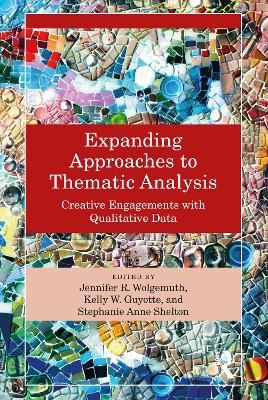
Expanding Approaches to Thematic Analysis
Routledge (Verlag)
978-1-032-48453-2 (ISBN)
Expanding Approaches to Thematic Analysis: Creative Engagements with Qualitative Data springboards readers into a world where generating themes from qualitative data is a creative, experimental, and wondrous process!
While no one ever said it had to be, thematic analysis is invariably described as a step-by-step process that involves coding. Yet qualitative data analysis is more than a technical procedure—it invokes imagination and inspiration—intuitional engagements that are as vital to the data analysis process as they are difficult to describe. This edited book begins with two premises: (1) there is more than one way to theme data, and (2) qualitative researchers do not have to code to get to themes. Each chapter introduces readers to a different approach to thematic analysis, explores that approach’s theoretical and disciplinary roots, and illustrates how that approach can be used to generate themes. Approaches include annotating, memoing, storying, writing, composing poems, artmaking, meditating, and more, expanding conceptualizations of what themes and thematic analysis can be. The book also includes ‘methodologies in action’: helpful examples of creative theming from doctoral students and early career scholars.
This book is as much a provocation for engaging thematic analysis beyond/without/in addition to coding as it is a resource for anyone interested in the rationale, justification, and examples for doing so. As such, it is a source of inspiration for any qualitative student, researcher, and scholar who wishes to expand their repertoire of approaches to thematic analysis.
Jennifer R. Wolgemuth is Associate Professor of Qualitative Research at the University of South Florida. Drawing on critical, poststructural, and new materialist theories, she explores inquiry as an agential process that simultaneously investigates and creates lives and communities to and for which researchers are responsible. Kelly W. Guyotte is Associate Professor of Qualitative Research at the University of Alabama. Always inspired by her background in the visual arts, her research interests include issues of gender and equity in higher education and artful inquiry practices, as well as qualitative pedagogy and mentoring. Stephanie Anne Shelton is Associate Professor of Qualitative Research at the University of Alabama. Guided by her extensive background in K–12 and teacher education, and situated within queer and feminist theories, she often engages in interview, focus group, and observation-based research that explores LGBTQ+ issues in educational research.
Introduction – Expanding Thematic Analysis: Beyond Coding, Toward Engagement Jennifer R. Wolgemuth, Kelly W. Guyotte, and Stephanie Anne Shelton. Chapter 1 – An Introduction to Theming the Data Johnny Saldaña. Chapter 2 – Ma(r)king Themes: Annotating as Thematic Analysis Stephanie Anne Shelton and Carlson H. Coogler. Chapter 3 – Memo Writing: Centrifugal and Centripetal Approaches to Thematic Analysis Paul Mihas. Chapter 4 – Spinning Thematic Webs: The Plasticity of Diagrammatical Analysis Melissa Freeman. Using Diagramming to Explore the Perceptions and Experiences of Spanish-Speaking Mamás and Their Students in the Context of the Seal of Biliteracy Anna Monica Segoviano. Chapter 5 – Reading Relationally: A Feminist/Queer Analytic Method Kelly W. Guyotte and Stephanie Anne Shelton. Not Just Reading Between the Lines: Analysis as a Generative Act Presence O’Neal. Chapter 6 – Thematic Resonances: Listening as an Alternative to Data Dissection Susan Cannon and Hannah Edber. Audio-Memoing as Accountable Listening: One Structure for Data Analysis Centering Indigenous Perspectives Jenni Conrad. Chapter 7 – Writing Toward Theoretical and Resonance Jessica Van Cleave. Narrative Fiction as Feminist Refusal: A Utopian Short Story of Lactation in Education Kelsey Benson. Making Sense Through Letter Writing Maddie Neufeld. Chapter 8 – The Logic of Peace: Practical Lessons from Thematic Analysis and Meditations James Salvo. Creative Silence and “Theme Jumping”: Meditation as Thematic Analysis Steve Haberlin. Chapter 9 – Getting Mixed Up: Arts-Based, Contemplative, and Generative Approaches to Thematic Analysis Kakali Bhattacharya. Deliberate Reflections: Unveiling Identities and Insights through Contemplative Data Analysis in Autoethnography Keishana L. Barnes. Chapter 10 – Recurring Languaging Practices as ‘Themes’ Francesca Williamson and Jessica Nina Lester. Applying Ubuntu in Thematic Analysis for Exploring Black Student Experiences at a Predominately White Institution Da’Ja’Nay Askew. Chapter 11 – Composing Poems: Using Poetry as Qualitative Data Analysis Sandra L. Faulkner and Wendy K. Watson. Methodologies in Action: Poetry as Thematic Analysis Chelsea Gilbert. Chapter 12 – I Have Hated Analysis: Poetic Thematic Analysis Maria K. E. Lahman. Chapter 13 – Quilt Tactics: Black Quilting as Method in Qualitative Research Stephanie (S.R.) Toliver. The Roots: A Golden Concept to Black Life Trevor McCray. Chapter 14 – Exploring Relationality, Wonder, and Resonance: Artmaking as (Thematic) Analysis Maureen A. Flint and Shannon A. B. Perry. Creating Visual Images to Enrich Thematic Analysis Kanwardeep Kaur Singh and Elizabeth Holliday Morgan. Finding Gems: Wondering Within Thematic Analysis Tye Campbell, W. Boden Robertson, and José Wellington Sousa. Chapter 15 – Who Are Photos For? What Are Photos For?: Thematic Analysis, Photovoice, and Photographic Practice Jasmine B. Ulmer. Let’s Go for a Walk: Critical Spatial Analysis and Participatory Theme Making Jason E. Titus. Chapter 16 – Performance Perspectives in Thematic Analysis Joseph D. Sweet. Chapter 17 – Comics-Based Thematic Analysis Marcus B. Weaver-Hightower. Chapter 18 – Wondering, Seducing… Thematic Nonsense Jennifer R. Wolgemuth, Travis M. Marn, and Daria Smirnova. Bowerbirding with Data Glowing Christie C. Byers.
| Erscheinungsdatum | 10.07.2024 |
|---|---|
| Zusatzinfo | 5 Tables, black and white; 31 Halftones, black and white; 31 Illustrations, black and white |
| Verlagsort | London |
| Sprache | englisch |
| Maße | 152 x 229 mm |
| Gewicht | 453 g |
| Themenwelt | Geisteswissenschaften ► Psychologie ► Allgemeine Psychologie |
| ISBN-10 | 1-032-48453-5 / 1032484535 |
| ISBN-13 | 978-1-032-48453-2 / 9781032484532 |
| Zustand | Neuware |
| Haben Sie eine Frage zum Produkt? |
aus dem Bereich


